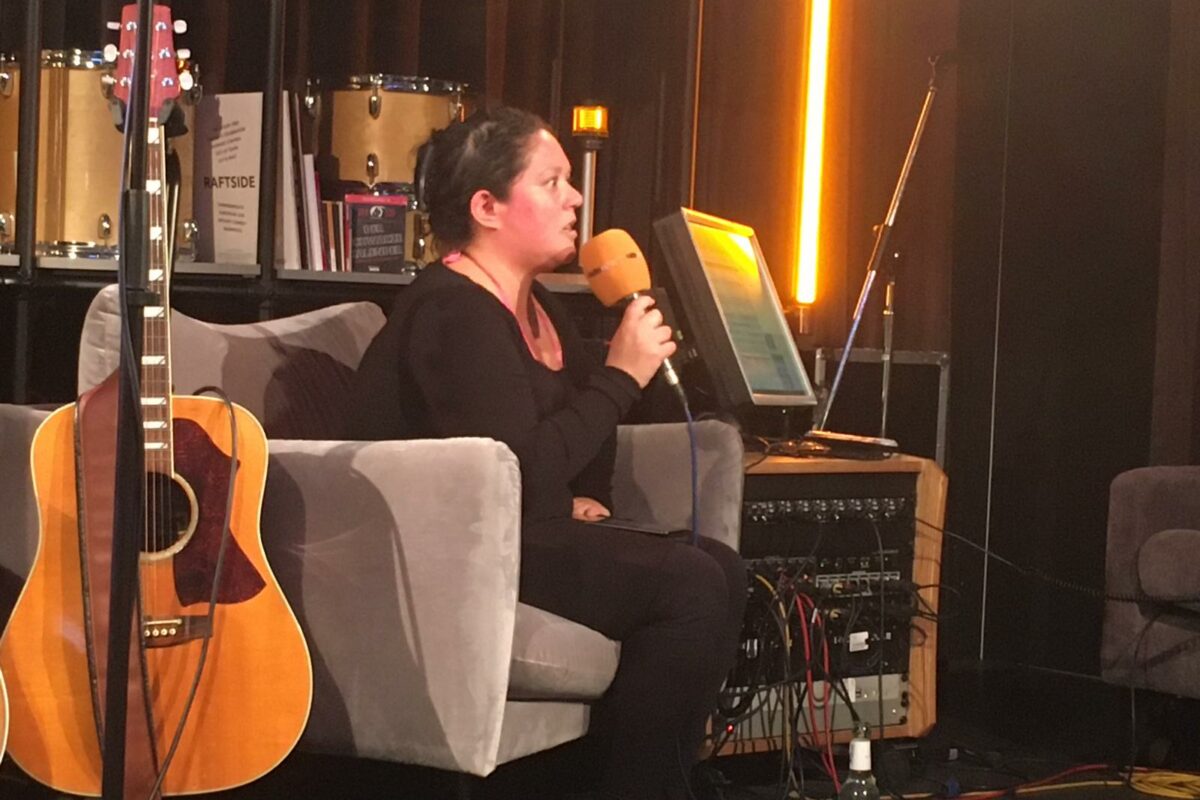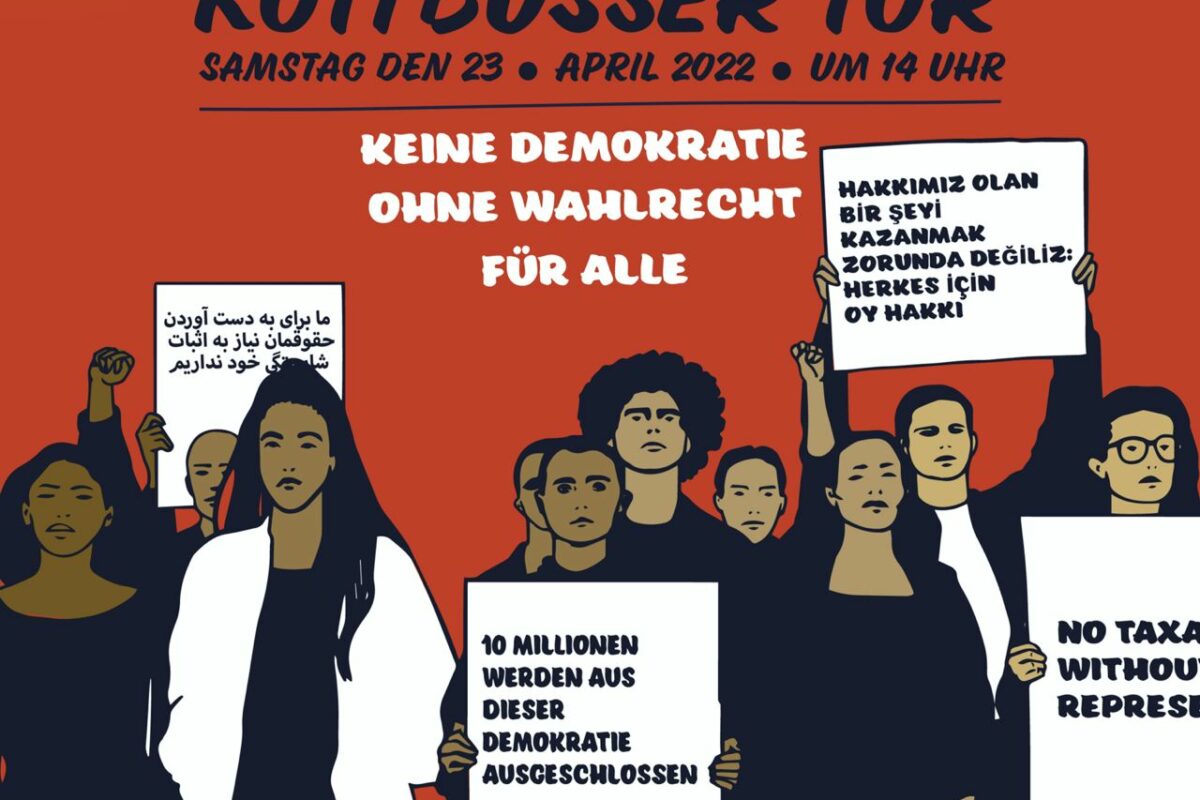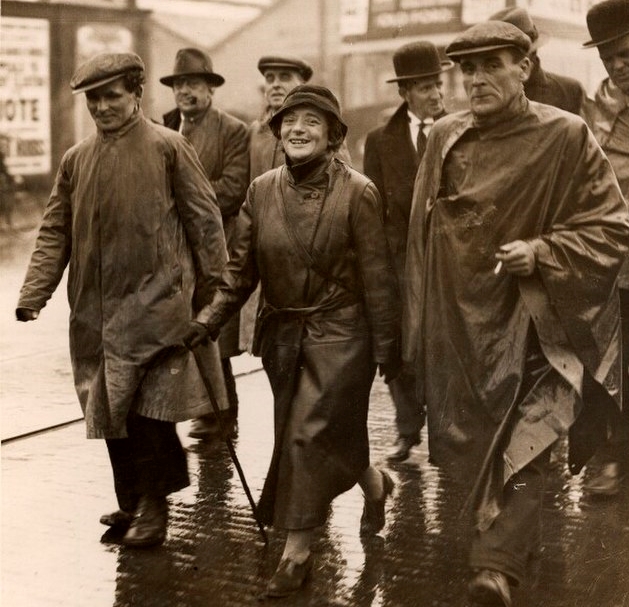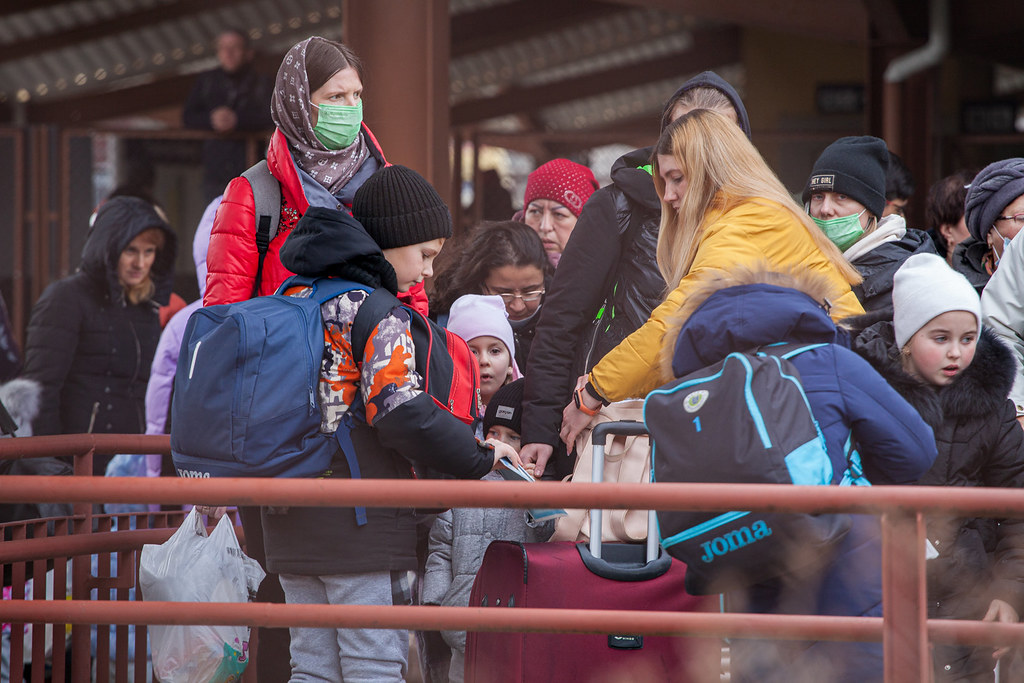Hi Jacinta. Thanks for talking to us. Could you start by saying something about yourself. How did a woman from Essex end up living in Lichtenrade?
I came to Germany aged 20 to improve my German. I was studying German at Exeter Uni. I moved back after my studies, and then I just spent 20 years fucking my life up.
Then gentrification kicked me out into Lichtenrade. I sometimes feel like I started the fire and then I got burned myself. When I came in 2000, all these Germans were telling me that 500 Deutschmarks a month for a 3 room flat on Kantstraße was too much. God knows what other people were paying in those days.
And now? It’s just not possible to live in the city and be working class, not if you want a new flat, which is what I needed for me and my 2 kids.
I was just fucking about really, when I got here. I was a classroom assistant, then I got pregnant at 23, I was on Hartz IV and then I became a TEFL teacher. Then all of a sudden, I’d been here a million years, Brexit happened, I had another kid and now I’m in Lichtenrade.
You also started on the comedy circuit?
Oh, yeah. I got into English language comedy by accident. I was doing all this spoken word stuff and people kept on billing me as a comedian. Around 2006, the English Theatre got us to do the Lab and put me down as stand-up comedy.
After doing that stand up, I started doing these shows with my ex-boyfriend called Prison Sex, and after that we did an English language Lesebühne called My English Class. But it wasn’t English language ex-pat comedy with the current super-macho environment. It was all just getting started. I mean, maybe there was a whole circuit I didn’t know about, but I think things were just getting going.
A couple of years later it was more toxic, more hateful, more sexist, more macho. As a woman in the audience, you had to have such a thick skin. You had to go in and listen to these boys saying that women were shit. Hours and hours of ‘ugly women are shit’, ‘pretty women are shit’, ‘sluts are shit’, ‘prudes are shit’.
One time, a friend of mine did a tiny skit about how comedians with guitars are shit. How someone who does a song with a guitar is not funny enough to be a comedian and they’re not good enough to be a musician. He had a guitar with him, it was a fucking joke. And this other white guy said “Oh, he went too far. I’m so offended. I’m not going to talk to him again. I can’t believe he could say that.”
We didn’t say triggered yet, but it triggered me so much. We women had to swallow so much hate just because we wanted to hear some funny jokes. Then you have to put up with 1% of what we put up with, and you have the audacity to be offended?
Everyone I complained to about it was, like “but someone who slags off women isn’t slagging off all women. When someone slags off a guy with a guitar, they really are slagging off all men with a guitar.” It was such bullshit. It was really annoying.
Then I went from English language comedy into the German poetry slam scene. I sometimes think I was a bit anti-American because I really blamed the white male Americans for the toxicity of the environment, the way they slagged off women. I found rape jokes unbearable, to be honest. But those American lads had given me such hard skin that I never really felt that poetry slams were that sexist. Looking back now, I think they were pretty sexist too, just slightly less hateful.
So, then, I went from the poetry slam scene to the Lesebühne scene, and I felt “this is really nice. It’s not that sexist at all”. And of course, now, after #MeToo, and all these kids who are much younger than me becoming really earnest and heartfelt, now I think the Lesebühne scene was also super-sexist.
American comedians were like “hahaha, women are so ugly, I had sex with an ugly woman, then I set her body on fire.” Whereas at the German poetry slam scene, the boys were all “Oh my god! I had sex with an ugly woman, and it was really disgusting and I wish I hadn’t”. And the Lesebühne boys were “I didn’t have sex with an ugly woman.” I felt like that was my journey.
The Lesebühnes seem more politically aware, but quite often when you perform, you’re the only woman. You’re the only person who’s not white, and you’re the youngest person there.
It’s lovely being the youngest person on at a Lesebühne, it’s like being a 42-year old teenager. The Lesebühnes aren’t woke, but they are political. A lot of people in the Lesebühne are anti-capitalist. They can be conservative about language sometimes, sure but they’re definitely not conservative in other ways.
But they’re still a load of white guys. And sometimes I feel like a bit of a performing dog, or even a traitor to the wokesters [laughs]. I go to a Lesebühne and I listen to all these white guys going “are we going to start saying Pfandflaschinnen?”, and I have this secret life as a woke ally, and I feel like a bit of a hypocrite sometimes.
How important is language?
It’s really interesting talking about the word “cunt”. As a British person, if you use the word, you’re not really being sexist, are you? Well, maybe you’re being sexist, but you’re not necessarily being misogynistic? Although recently I’ve got to say you see more and more British people on the Internet use “cunt” to refer to women. And, you know, I’ve only said that word in front of my mother once. Like one time. I said fuck all the time but cunt once – and it was by accident. Because, you know, even in British English, it’s this really strong word, right? Really strong, really forceful.
But I feel like in British English it doesn’t have this hateful, misogynist element to it that it does in American English. I remember posting this thing about Pooh and Eeyore after the British election in 2019. It said “I’m going to vote Tory because I wanna get Brexit done. And Pooh says to Eeyore “that’s because you’re a thick cunt”.
I knew when I posted it that Germans are going to think that this means “dicke Fotze”, but I still wanted the joy of posting it. And someone did comment underneath, “I can’t believe you’re posting this anti-women nonsense. Why are fat women to blame for the election?” Because the American word “cunt” and the German word “Fotze” really mean something else than the British word.
And when you’re British or Australian, and you want to use the word, and you’re in an international space, you really have to weigh it up with the fact that people are going to think that you hate women, and that’s why you think that word is ok. And are you okay with people thinking that?
It’s not just that. Also people in Britain say that any word which refers to the female anatomy is of itself sexist.
Oh, I’ve also heard that argument. That’s just stupid. In English you can call someone a tit or a twat or a dick or an arse. The sexist part is that cunt is the worst word, that cunt is such a bad insult with this idea of evil hanging around it. The idea that women’s bodies are ugly, dirty, dangerous. The ominous part of the word cunt – that is the misogynist bit. But it’s such a fun word to say.
When you’re just trying to describe someone like Richard Littlejohn? He’s just a cunt. What’s the German equivalent. Thilo Sarrazin? He’s a bit of a cunt. The word cunt ends the argument. We know this person now.
But language changes all the time, doesn’t it? I’m not going to be aged ninety on my own in a field with a banner saying cunt is not misogynist. If it starts to be in the next ten years that every time someone hears the word, they think it’s a misogynist slur, then I guess I’m going to stop using it. I think I have started using it less, if I am honest.
That’s not because I’m giving in, is it? I don’t mean cunt as a misogynist slur, but if 99% of the world understands it as a misogynist slur then I’m not communicating properly.
Do you think that you can do comedy about serious subjects?
Yes, and I think that this is a big difference between me and Germans. This doesn’t mean that I think Jimmy Carr’s Roma joke was ok. People are trying to say that he was doing satire, and he was trying to shock the audience and show a mirror to them. But the trouble is that them cheering means he failed.
But I really think the difference between me and most people in Germany, still after all these years, is that I think you can and maybe even should do comedy about serious things. I think you can joke about serious things. I think comedy can even change the world, you know? Like my last book about housework – I think the humour in that book was a weapon, really. Whereas Germans often seem to think that if you are being funny, that means you don’t really mean what you’re saying – or care about the subject.
Let’s go onto your new book. You’ve got a new book coming out.
And the book is coming out with Satyr, which is kind of like the Lesebühne poetry slam Verlag. So I mustn’t slag the Lesebühnes off too much! One of the reasons I wanted to do this book with Volker [publisher Volker Surmann] is because Volker and the Lesebühnes in general really do believe in freedom of speech, freedom of art, freedom of expression. They really believe in that stuff. They think you have the right to say almost anything.
And so I knew that with Volker I could do this mainstream comedy book explaining what Germany’s like, a funny, entertaining book, but I also knew he wouldn’t try and censor me from saying Germany’s racist, Germany’s a shithole, Germans are the worst. Like even if he doesn’t agree with me!
You’ve been outspoken about teachers being banned for wearing headscarves in German schools. Do you think this is just a German thing or is it more general?
I don’t know, really. I’m writing about Germany and this is the situation in Germany. I always think something doesn’t need to be specifically German for me to to write about it.
But what I think is really specifically German is people who are so into every other type of freedom except for the freedom of brown women to not show people their hair.
Like, people who are in favour for Freikörperkultur, where you’re allowed to get your tits out in normal parks and swimming pools, people who are in favour of white people being encouraged to wear dreadlocks without ever hearing any criticism why this is problematic. And then all of this freedom suddenly stops because someone doesn’t want someone else to see their hair in public. It’s crazy.
It’s absolutely nothing to do with women’s liberation at all. I do not mean by that that I find the headscarf completely unproblematic. Sometimes I think, you know, I would love to be fighting right now for teenagers who don’t want to wear the headscarf and their dads are forcing them into it. But how the fuck can I in Germany when it’s just acceptable that there is a job ban on a whole group of people?
I know people who get Botox and liposuction and wear high heels and they think the headscarf’s really sexist because women wear it and men don’t. Like, women also wear high heels and men don’t? And high heels fuck your body up a little bit more than the headscarf does!
I’m not saying I want anyone to wear a headscarf. I don’t care if people wear headscarves or not. But banning a bit of cloth from the top of your head just because that’s your religion? We live in a country of Religionsfreiheit. Is there freedom of religion in Germany or is there not?
Do you think that Germany is more racist, than, say, Britain?
It’s hard to tell, but I think that middle class educated white Germans are more racist than middle class educated white British people.
Things have changed a lot. I can remember someone asking me about 15 years ago in a bar in Neukölln if I thought the Turkish kids would steal our bags. When I said No, they said ‘you think I’m being really politically incorrect? You think it’s racism?’ I was like, no, I think it’s weird though. I think it’s the weirdest thing that anyone has ever said to me.
Back in the early 2000s, if you arrived at a party, and said some guy was coming on to you, bothering you, it was normal for someone to say ‘it must have been a Turk’. And when you were shocked, they were shocked that you were shocked. That’s changed, huh? People don’t come out with crap like that in polite society anymore.
But you still hear some fucked-up shit. People literally complain about kids starting school not being able to speak German, and then in the next sentence complain about kindergartens that are full of too many Roma kids. Where are these Roma kids meant to learn German?
Back to the book. What’s the one thing everybody needs to know about Berlin?
The Church Tax chapter is really important. So unsuspecting white people don’t get bogged down with Church Tax. It’s also about language. Can you get in there, I’m basically the modern Mark Twain? My top tip is: don’t bother learning the adjectival endings, just guess. They’re not important.
The book is a language and etiquette guide from someone who’s pretty shit at language and etiquette. It’s like an un-ableist version of the blind leading the blind. The unaware leading the unaware.
Where can people order your book?
They can order it from the publishers, Satyr Verlag. It’s also great for me if people go to their local bookshops and ask for it. And I’ll have copies to sell if you catch me at a Lesebühne!
Jacinta will be reading from her new book at the LINKE Internationals Summer Camp on 25th June. You can register for Summer Camp here.



